calsfoundation@cals.org
Eudora (Chicot County)
| Latitude and Longitude: | 33º06’34″N 091º15’43″W |
| Elevation: | 135 feet |
| Area: | 3.09 square miles (2020 Census) |
| Population: | 1,728 (2020 Census) |
| Incorporation Date: | February 8, 1904 |
Historical Population as per the U.S. Census:
|
1810 |
1820 |
1830 |
1840 |
1850 |
1860 |
1870 |
1880 |
1890 |
1900 |
|
– |
– |
– |
– |
– |
– |
– |
– |
– |
– |
|
1910 |
1920 |
1930 |
1940 |
1950 |
1960 |
1970 |
1980 |
1990 |
2000 |
|
606 |
1,197 |
2,020 |
1,808 |
3,072 |
3,598 |
3,687 |
3,840 |
3,155 |
2,819 |
|
2010 |
2020 |
|
|
|
|
|
|
|
|
|
2,269 |
1,728 |
|
|
|
|
|
|
|
|
The city of Eudora, in the southeastern corner of Arkansas, was built on land rising twenty-five feet above the surrounding Delta flatlands. It came about as a result of antebellum plantations and an early twentieth-century railroad. Eudora survived the Flood of 1927 because of its elevation. The city calls itself the “Catfish Capital of Arkansas.”
Louisiana Purchase through Reconstruction
The rich land on which Eudora was established was still only sparsely settled when Arkansas became a state in 1836. A Presbyterian church was built on the ridge in the 1840s, and a Masonic lodge opened at that location in 1848. E. C. James owned 700 acres of Chicot County land, including the ridge; he named his homestead Eudora Plantation for his daughter, Frances Eudora James, who died at the age of four in 1858. The same name was given to the post office on the ridge, which opened on December 4, 1856, but closed in 1867, opened again in 1871, closed a second time in 1876, and reopened in 1888. The site also was used for the landing of a ferry that crossed Bayou Macon beginning in 1856. The same location was just a few miles from a Mississippi River port variously known as Barnard and Grand Lake.
African-American slaves outnumbered free whites in southern Chicot County until slavery ended in Arkansas with the conclusion of the Civil War. Slave labor helped to build levees, which protected the farmland on and near the Eudora Plantation. The first house built within the borders of what today is Eudora was constructed by a family named Sweet around 1858; it later became known as the W. H. Stephenson house. First Baptist Church, one of the first African-American churches in the area, was established in 1860.
Civil War through the Gilded Age
Some Civil War chronologies mention a skirmish at Eudora Church on May 9, 1864, but no reports or records describe that event. The end of slavery after the Civil War had a major impact upon the cotton plantations of the region. In 1866, Ferdinand Weiss arrived from Germany and, with his brother Herman, opened a store they called H. Weiss and Co. Competing stores were opened in 1868 and 1870.
The Bayou Macon ferry was replaced by a wooden bridge in 1886. By 1895, four white families lived on the ridge, as well as several black families. Farming of cotton and of corn, as well as timber operations, continued. Doctor Samuel Augustus Scott had built a house around 1883; he served families in southern Chicot County and also in much of northeast Louisiana.
Early Twentieth Century
In 1901, the Iron Mountain Railway began a line to connect Memphis, Tennessee, with Helena (Phillips County) and Louisiana. The tracks were completed through the Eudora region by the end of 1902. The arrival of the railroad prompted E. R. Armstrong to survey a community on the ridge on April 4, 1902. Armstrong named the new city Carmel, but both the railroad stop and the re-established post office took the older name Eudora from the James plantation. A one-room schoolhouse was built for white children around 1900, and a Baptist church for white families was built in 1903. The Bank of Eudora opened in 1904, the same year that the first brick building was constructed on Main Street. Telephone service began in 1906, followed by electric service in 1914 and water and sewer systems in 1916. An Episcopal church was founded in 1911. The public school opened a new building in 1909 and completed an addition to the school in 1916. The first high school in Eudora opened in 1928. By 1918, a highway had been completed that connected Eudora to Pine Bluff (Jefferson County). At least thirty-six men from Eudora served in the United States’ armed forces in World War I; Manse Streetman was the only fatality from this group.
Several newspapers were begun in Eudora, including the Eudora Item in 1912, the Eudora Herald in 1917, and the Eudora Radio in 1925. None lasted for more than a few weeks. The Flood of 1927 devastated most of Chicot County, along with much of the rest of Arkansas. Eudora’s elevation above the river plain preserved the city from flood damage and made it a natural site for a Red Cross camp, which served 3,000 refugees at its peak. Like many other local banks in Arkansas, the Bank of Eudora was acquired by A. B. Banks, but it closed on November 17, 1930, when Banks’s American Exchange Trust Company collapsed. The bank was reopened the first day of 1931 as Eudora Bank; by the end of the year, it was the only bank open in Chicot County. Depression-era government projects in Eudora included highway construction by the Works Progress Administration (WPA) and a city hall built in 1936 by the Public Works Administration (PWA). The city hall building, which is still in use as of 2010, was financed by a PWA loan of $9,000 along with a PWA grant of $6,142. The American Legion Post 127 Building was erected with assistance from the Civil Works Administration (CWA).
World War II through the Modern Era
Eudora and Chicot County residents fought the Axis powers in World War II; thirty-two soldiers from the county died during the conflict. Returning soldiers found few work opportunities in the region. Jim Crow laws required separate schools for African Americans and whites until the Brown v. Board of Education of Topeka, Kansas decision of the United States Supreme Court in 1954 struck down “separate but equal” schools for the two groups. Like many other Delta communities, Eudora attempted a “school choice” program that voluntarily continued segregation policies. As recently as 2003, courts were addressing the fact that white students from Eudora were enrolling in the mostly-white schools of West Carroll parish of northeast Louisiana rather than attending the school in Eudora. In 1970, 1,200 African-American students boycotted the junior and senior high school of Eudora protesting the firing of an African-American teacher.
Major employers in Eudora in the twenty-first century are the Superior Uniform company and the Honest Select Catfish Plant. The city holds a Summerfest the first Saturday of June. Other attractions include the Eudora Museum; the J. Austin White Cultural Center, which opened in 2008 and supports music, art, and theater programs for children and youth; and the Eudora Garden Center, a WPA-built vertical log building that was restored by the Eudora Garden Club. The Rubye and Henry Connerly Museum displayed artifacts of the Eudora area in a historic grocery store, although that structure was destroyed in a fire. Eudora is one of the featured cities on the Great River Road. The city also boasts of its proximity to the Mississippi River and to Grand Lake, described as one of the finest fishing lakes in the country. These fishing opportunities have led Eudora to bill itself as the “Catfish Capital of Arkansas.”
Famous Residents
Famed track and field coach Clyde Hart was born in Eudora.
For additional information:
Brannon, Sheila Farrell. Tribute to Chicot County, Arkansas. Dermott, AR: 2000.
Cashion, Elbert Thomas, Sr. A History of Eudora, Arkansas. Lake Village, AR: Jones Printing Company, 1977.
Steven Teske
CALS Encyclopedia of Arkansas
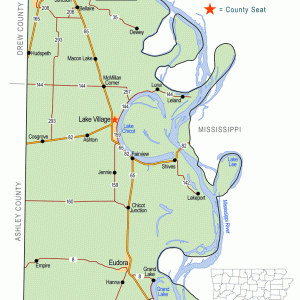 Chicot County Map
Chicot County Map 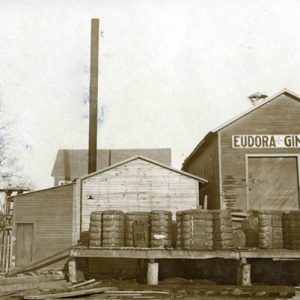 Eudora Cotton Gin
Eudora Cotton Gin 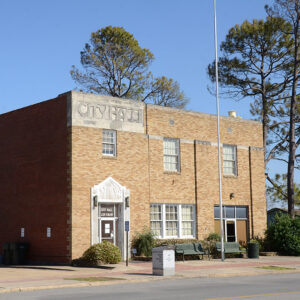 Eudora City Hall
Eudora City Hall 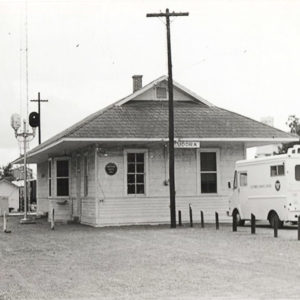 Eudora Depot
Eudora Depot 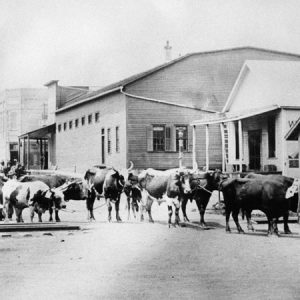 Eudora Ox Team
Eudora Ox Team 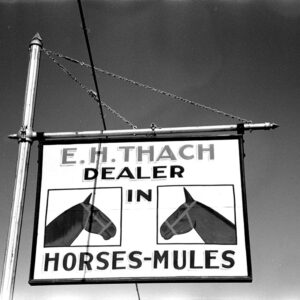 Eudora Sign
Eudora Sign 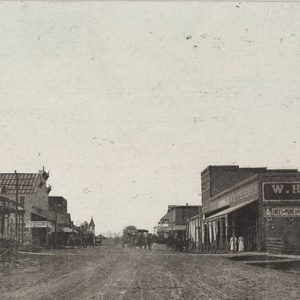 Eudora Street Scene
Eudora Street Scene 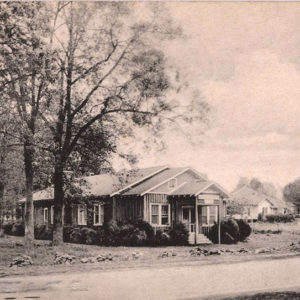 Legion Hut
Legion Hut 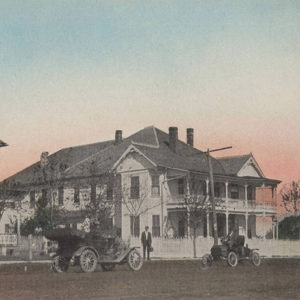 Parkman Hotel
Parkman Hotel 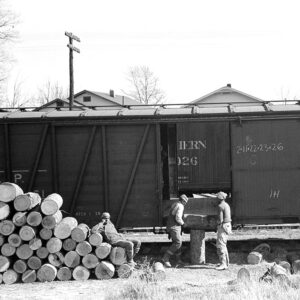 Stave Logs
Stave Logs 




My parents grew up in Eudora in the 1940s, and I enjoyed visiting my grandparents, the Harold Stephensons. My granddad was a cotton buyer.
I grew up in Eudora in the 1950s. Wonderful place for a nine-year-old boy. My house was a French-designed plantation house situated on a 150-acre remnant parcel of a much larger farm. The property fronted on the south end Main Street and consisted of a one/two-story cow barn, a fairly large office building, a commercial-style garage, a chicken house, a pigsty, and a windmill.